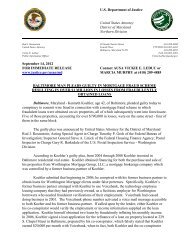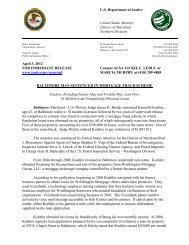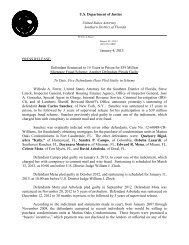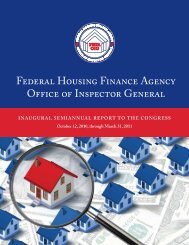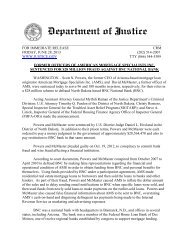FEDERAL
Sixth Semiannual Report to the Congress - Federal Housing ...
Sixth Semiannual Report to the Congress - Federal Housing ...
- No tags were found...
Create successful ePaper yourself
Turn your PDF publications into a flip-book with our unique Google optimized e-Paper software.
Over time, the enterprise increased its volume<br />
of business with the company, which ultimately<br />
collapsed, leaving the enterprise to file a $1.8 billion<br />
bankruptcy claim against the company. 215<br />
As the enterprises can benefit from sharing<br />
information, so can government agencies involved<br />
in housing finance. Although much of the focus on<br />
housing finance reform has been on clarifying the role<br />
of private entities such as the enterprises, overlapping<br />
government agencies also need clear missions with<br />
respect to the housing market. For instance, multiple<br />
federal consumer protection laws apply to residential<br />
mortgages. Historically, federal banking regulators<br />
such as the Office of the Comptroller of the Currency<br />
and FDIC enforced these laws. Recently, the new<br />
Consumer Financial Protection Bureau has taken on<br />
much of this responsibility. 216<br />
As one of our reports demonstrated, however, this<br />
crowded field can leave oversight gaps. For example,<br />
we found that FHFA does not review how the<br />
enterprises monitor contractual requirements related<br />
to federal consumer protection laws. Instead, like the<br />
enterprises, the agency relies on the work of other<br />
regulators. Consequently, FHFA was vulnerable<br />
to questions about why it does not monitor the<br />
enterprises’ activities to ensure they are aligned with<br />
the public’s interest (e.g., enforcement of consumer<br />
protection laws with respect to loans the enterprises<br />
purchase). In addition, we found that the enterprises<br />
were potentially subject to an increased economic<br />
risk from buying mortgages that were originated<br />
in violation of such federal laws. 217 In cases of<br />
overlapping regulatory oversight, FHFA and other<br />
affected regulatory bodies in a reformed market will<br />
benefit from clear jurisdictional boundaries.<br />
Housing finance regulators may also benefit from<br />
information sharing. For instance, we have worked<br />
closely with other inspectors general who have an<br />
interest in housing issues. This collaborative effort led<br />
to a compendium of federal single-family mortgage<br />
programs. 218 We have also worked with HUD-OIG<br />
to report on recent initiatives by HUD and the GSEs<br />
to shrink their respective REO inventories and the<br />
steps our offices have taken to assess HUD’s and the<br />
enterprises’ REO activities. 219<br />
Whichever way policymakers shape the future<br />
housing finance market, we believe participants<br />
can benefit from avoiding or clarifying some of the<br />
inherent tensions outlined above. Clear guidance will<br />
help ease the transition into a reformed mortgage<br />
market and provide for its enduring stability.<br />
Conclusion<br />
We have presented here a more granular analysis of<br />
the soundness, oversight, and balance issues that will<br />
likely be important in any future housing finance<br />
market. Our observations are intended to inform<br />
the ongoing policy debate, and we look forward to<br />
continuing our work.<br />
70 Federal Housing Finance Agency Office of Inspector General



